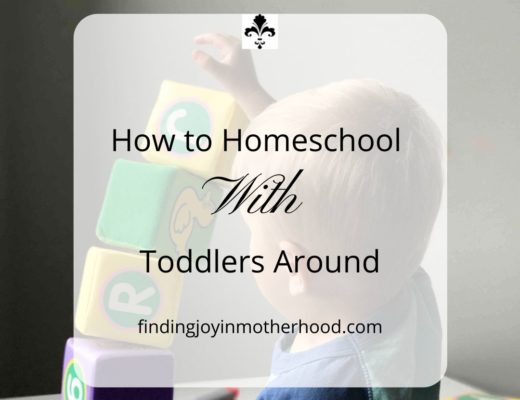If you find yourself in the surprising situation of homeschooling due to school closures for Coronavirus precautions, here are some tips on how to homeschool when your school closes from a mom who taught in schools for five years, and homeschooled seven children. Sanity for all (especially mom or dad) is the overriding objective.
First of all, look at the situation from a positive perspective. You’ll have an extended time to enjoy your kids, see what they’re doing in school, and have experiences of bonding that will last a lifetime. Approach the days embracing the opportunity.
You also have a chance to help them develop virtues that will serve them well in life, and also honor all in the family – patience, kindness, using their time well, orderliness, and responsibility just to name a few. YOU will also have the chance to work on those virtues! Before I began homeschooling, I was seriously impatient. I learned that patience helped the tone of the whole family, and was worth the effort it took for me to develop that simple virtue.
There will be good days and not great days. The more positive and cheerful we are, the better the children will behave!
Homeschooling Schedule
Decide You are the Boss
Let your no mean no, and your yes mean yes. They will appreciate the guardrails you’re putting up in their day. Remember, they are told what and when they can do everything in school – even when they can go to the bathroom! So, don’t be shy (you’re not being mean) by creating a schedule that works for everyone. Don’t forget, former teacher here so I know how critical order is.
Set the Schedule
- This is absolutely critical, or you will be in constant arguments with your children about what to do and when to do it. Let them know you have a schedule and you will enforce it, or they will have consequences.
- YOU set the schedule. Don’t ask for input, don’t let them give input. Trust me, they are used to this in their classroom.
- You can find the schedule I successfully used HERE. It is designed to capitalize on the children’s best learning times, while also being efficient during the day so that there’s plenty of play time at the end. My children in primary grades (1-3rd) finished their work before lunch, while the older children usually had one class to complete after lunch. After independent reading time, they could play until chores before dinner.
Communicate the Schedule
- Have a sit down with the kids and let them know what the schedule will be and your expectations in keeping the schedule. Let them know that there won’t be any adjustments to the schedule unless YOU want it! That’s how a teacher would do it in a classroom.
- Communicate the positive consequences they’ll be able to enjoy when they finish their schoolwork each day without your nagging or reminding them, as well as the negative consequences they’ll suffer if they don’t take responsibility for their work and day. (Make sure you have appropriate negative consequences. Hopefully, you won’t have to use them, but be prepared to enforce if necessary.)
Keep the Schedule
- Don’t give in to sleeping in. Have a set time for you and the kids to get up. Make it clear that this isn’t vacation – the schools are expecting you to guide them to do their work. Children’s brains turn to mush pretty quickly when they don’t have consistent mental challenges.
- NO tv or PlayStation, no phones or computers (unless necessary to do work) until after 4 PM or until all schoolwork is finished. Side note – the less tech you have in the home the calmer and kinder your home will be.
- Daily Chores – an absolute must! Everyone should share in the responsibilities of keeping their space and the home neat, clean, and orderly. You can find age-appropriate chores here.
- You’ll notice there’s time in the schedule in the early afternoon for independent reading time. Here’s a list of excellent reading books for your children.
Print Out the School’s Assignments
- You can download a lesson plan page here, that you can copy and fill in with the school’s assignments. When your child completes the day’s assignments, handmade goofy-face drawings or a simple star will be a small but enjoyed sign of accomplishment.
Consider a Reward System for the Time They’ll be Home
Let’s not forget that this unexpected time home will also be hard on the kids. They’ll have to quickly learn new habits of studying/learning in an environment with more distractions than in their usual classroom.
We all like to work for positive incentives. Creating a calendar with an opportunity to earn 1 credit a day towards a treat can be a game-changer in eliminating procrastination.
- Set a goal for a special treat they will earn if they have a certain amount of daily credits. If you have 10 days of homeschooling, consider a reward or treat worth 8 credits (we all have bad days).
- If the children are younger, set the reward for 4 credits in a week.
- Let them know what the reward will be – maybe special pizza, or making cookies with you.
- Credits are ONLY earned if you haven’t nagged and complained at them to complete their work. Simple redirects if/when they lose focus aren’t a problem, but they should be working as independently as possible.
Use This Time as an Opportunity
After the assigned work is completed, have craft/creative/art projects and supplies available for them to spend time creating when they normally would be still in school or just getting home. It would be a great opportunity to bake with them, cook with them, or let them “waste time” drawing, playing with clay or sculpting with Wikki Stix etc…
In our busy world, children don’t usually have time to explore what can really bring them joy. Try to see this school closure and coronavirus precaution as a way to give them that small gift – time to slow down, explore their creative minds, and just be kids.
Have a good week!
Janet
Share this article with others on Pinterest






No Comments